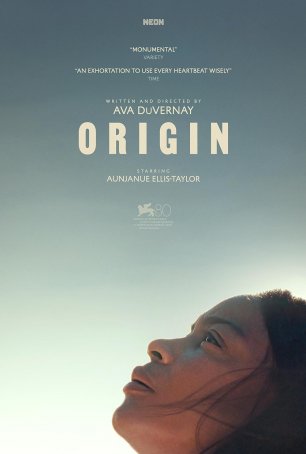Origin (United States, 2023)
January 25, 2024
Ava DuVernay’s Origin functions both as a bio-pic of Pulitzer Prize-winning author Isabel Wilkerson and an exploration of the philosophy underlying her best-selling book, Caste: The Origins of Our Discontents. Although the movie has a narrative arc, portions of it are documentary-like in their presentation. In fact, the film’s final quarter is primarily devoted to explaining Wilkerson’s thesis and exploring some of its implications. Although a feature film can’t hope to go too deeply into details, Origin devotes enough of its running time to the theory that it gains as much traction as one might hope from anything short of a pure documentary.
A high-level description of Wilkerson’s proposal is that racism in the United States is linked to antisemitism in pre-World War II Germany and the discrimination against the Dalits (Untouchables) in India. Her perspective is that all represent different facets of a pervasive caste system and are fundamentally the same, characterized by eight “pillars” that she identifies. One doesn’t necessarily have to agree with the thesis to be impressed by the intellectual rigor (and legwork) that went into its development and refinement. The greatest achievement of Origin is that it follows this process without turning it into a travelogue. The result is powerful and compelling.
The movie begins with a chilling recreation of the night in February 2012 when Trayvon Martin (Myles Frost) took his final walk. Martin’s death provides the impetus for author Isabel Wilkerson (Aunjanue Ellis-Taylor) to begin formulating her theory. As it percolates, she is beset by tragedies. First, her husband, Brett Hamilton (Jon Bernthal), dies suddenly. Then, within a year, her aging mother, Ruby (Emily Yancy), follows. After a period of mourning, Wilkerson throws herself into her work, first taking a trip to Berlin then later visiting India. The result of eight years of reflection, consideration, and work is the 2020 publication of Caste: The Origins of Our Discontent.
 Although the movie contains a fair amount of philosophy,
history, and anthropology, its narrative elements (focusing on the tragedies that
compel Wilkerson to write the book) are affecting. This is due in part to the
performance of Aunjanue Ellis-Taylor but credit must also be given to DuVernay,
who achieves a nearly perfect tone for the material. Origin comes across
as questioning but not preachy. It blends drama with intellectually interesting
propositions in a way that allows both aspects to co-exist.
Although the movie contains a fair amount of philosophy,
history, and anthropology, its narrative elements (focusing on the tragedies that
compel Wilkerson to write the book) are affecting. This is due in part to the
performance of Aunjanue Ellis-Taylor but credit must also be given to DuVernay,
who achieves a nearly perfect tone for the material. Origin comes across
as questioning but not preachy. It blends drama with intellectually interesting
propositions in a way that allows both aspects to co-exist.
When it comes to depicting the vignettes that form the backbone of Wilkerson’s theory, Origin takes us on a whirlwind journey across the years and around the world, from the cramped darkness of a ship in the Middle Passage to a frenzied pro-Nazi rally in pre-WW2 Germany to the segregated towns of Jim Crow Alabama to the crowded streets of modern-day New Delhi. Snippets of the stories of minor characters come to life.
 Although Wilkerson (and, by extension, DuVernay) focuses on
the injustices perpetrated on the minority/lower castes, there are moments of
hope. This is perhaps most clearly shown in a minor incident involving the author’s
interaction with a plumber wearing a MAGA cap (played by Nick Offerman). It’s
also evident in the last line of the book, which is quoted near the end of the
film: “A world without caste would set everyone free.”
Although Wilkerson (and, by extension, DuVernay) focuses on
the injustices perpetrated on the minority/lower castes, there are moments of
hope. This is perhaps most clearly shown in a minor incident involving the author’s
interaction with a plumber wearing a MAGA cap (played by Nick Offerman). It’s
also evident in the last line of the book, which is quoted near the end of the
film: “A world without caste would set everyone free.”
Movies that challenge have becoming increasingly rare in a motion picture atmosphere that favors trifles, nostalgia, and brain-dead blockbusters. Origin bucks the trend by inviting the viewer to become intellectually engaged. Although I don’t agree with some of Wilkerson’s conclusions, there is validity in her hypothesis and I was intrigued by the eight pillars – Endogamy, Divine will, Heritability, Purity and pollution, Occupational hierarchy, Dehumanization and stigma, Terror and cruelty, and Inherent superiority and inferiority of castes. Regardless of one’s personal views about the subject, Origin offers plenty to ponder and argue. How many movies in 2024 can make that statement while maintaining a somewhat traditional narrative format? Origin offers the best of both worlds: a well-developed story with a three-dimensional lead character who grows over the course of the movie and an intellectually satisfying element folded into the screenplay.
Origin (United States, 2023)
Cast: Aunjanue Ellis-Taylor, Jon Bernthal, Niecy Nash-Betts, Emily Yancy, Blair Underwood, Vera Farmiga
Screenplay: Ava DuVernay, inspired by “Caste: The Origins of Our Discontents” by Isabel Wilkerson
Cinematography: Matthew J. Lloyd
Music: Kris Bowers
U.S. Distributor: NEON
U.S. Release Date: 2024-01-19
MPAA Rating: "PG-13" (Profanity, Adult Themes, Violence)
Genre: Drama
Subtitles: none
Theatrical Aspect Ratio: 2.35:1
- Nickel Boys (2024)
- (There are no more better movies of Aunjanue Ellis-Taylor)
- (There are no more worst movies of Aunjanue Ellis-Taylor)
- (There are no more better movies of Niecy Nash-Betts)
- (There are no more worst movies of Niecy Nash-Betts)
Comments